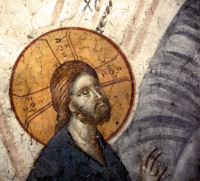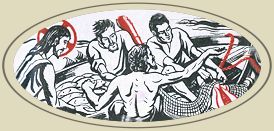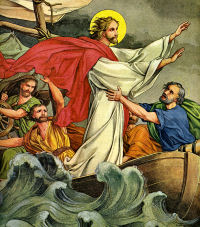» Enjoy our Liturgical Seasons series of e-books!
And a great storm of wind arose, and the waves beat into the boat, so that the boat was already filling. But he was in the stern, asleep on the cushion; and they woke him and said to him, "Teacher, do you not care if we perish?" And he awoke and rebuked the wind, and said to the sea, "Peace! Be still!" And the wind ceased, and there was a great calm. He said to them, "Why are you afraid? Have you no faith (Mark 4:37-40)?"
Click here for commentary on the readings in the 1962 Missal of the Roman Rite.
Sunday Readings
The first reading is taken from the Book of Job 38:1, 8-11.
The second reading is from the Second Letter of Paul to the Corinthians 5:14-17. St. Paul is urging his converts never to forget what being a Christian means. They have been given a new mode of life because Christ died and rose from the dead for them.
The Gospel is from St. Mark 4:35-41. There is a very important lesson for every one of us in today's gospel story. Our lives are really a journey across the sea of time to the shore of eternity. During that crossing all who come to the use of reason encounter some storms. There is no smooth, calm crossing for anyone. This is the will of God. Our Lord knew that a storm was going to blow up that night in the Sea of Galilee. He allowed his disciples to face that terrifying ordeal, because he wanted his future Church to have confidence in his divine power and assistance, when tribulations and persecutions would seem to be on the point of ending her forever. Down through the centuries the Church of God has had to face storms and trials which would have swamped her if she had not a divine Founder and Protector. Christ, however, kept his promise — the gates of hell cannot prevail against her. She survived the storms and as a consequence of them gained new vigor and strength.
That same divine guarantee which Christ gave his Church will be with her until the last human being on earth has entered heaven. It is with her today. It will save her from internal weaknesses which could do more damage to her spiritual vitality than open persecution from without could ever do. We know Christ is in the barque of Peter. He is waiting to be called. If we realize that of ourselves we are not able to weather this storm, and call on him, he will rebuke the winds of pride and calm the waves of turbulent self-assertion. The barque of Peter will enter calm waters once more.
 What is true in the life of the Church is true also in the life of each member of the Church. God foresees all our life's storms. He permits them, because he is to use them as means to help us in our struggle to reach heaven. If we use these storms or trials of life to come closer to Jesus, to throw ourselves on his mercy, they will serve the purpose for which he permits them. Unfortunately, there are Christians who question not only the goodness of God, but his very existence, when some heavy seas break across their life's barque. "How could God, if he be good," they ask, "allow me to suffer like this, I who have been so faithful? Why should he let me bear all this poverty, all these pains, all this dishonesty of my fellowmen, when a small act of his will could remove it all and make me healthy, happy and prosperous?"
What is true in the life of the Church is true also in the life of each member of the Church. God foresees all our life's storms. He permits them, because he is to use them as means to help us in our struggle to reach heaven. If we use these storms or trials of life to come closer to Jesus, to throw ourselves on his mercy, they will serve the purpose for which he permits them. Unfortunately, there are Christians who question not only the goodness of God, but his very existence, when some heavy seas break across their life's barque. "How could God, if he be good," they ask, "allow me to suffer like this, I who have been so faithful? Why should he let me bear all this poverty, all these pains, all this dishonesty of my fellowmen, when a small act of his will could remove it all and make me healthy, happy and prosperous?"
What such a Christian forgets is that God's purpose in creating him was not to make him healthy, happy and prosperous in this life, but to give him a share in his own eternal happiness in heaven. If this life were the end and sum-total of man, if all ended with death, then certainly that complaint would have some foundation. However, our human intelligence, and divine revelation, prove to us conclusively that this life is not an end for man but a means with which to attain his real end, perfect happiness.
Therefore, we must not expect to get from life what it cannot give. Instead, we must use what it gives us, the unpleasant as well as the pleasant, the rain as well as the sunshine, the pain as well as the pleasure, as means which will help us to reach our perfect ending, our eternal dwelling-place in heaven. Too often like the disciples that night in the storm, we think that God has forgotten us, that he is not interested in us when storms break around us. In fact, it is then that he is nearest to us. We think he is sleeping and that all is lost, when he is but using this storm to rekindle our faith, and make us realize that we are pilgrims on our way across this earth and not permanent residents here.
—Excerpted from The Sunday Readings by Fr. Kevin O'Sullivan, O.F.M.
Commentary for the Readings in the 1962 Roman Missal:
Fourth Sunday after Pentecost
 "Put out into the deep . . . lower your nets for a catch . . . Henceforth thou shalt catch men" (Gospel)
"Put out into the deep . . . lower your nets for a catch . . . Henceforth thou shalt catch men" (Gospel)
Simon Peter received the "call to action." How did he respond? "At Thy word I will lower the net." What was his reward? "All . . . were amazed at the catch." The call to Catholic Action has been repeated by the Popes in our day. "They (have) beckoned to their comrades . . . to come and help them" (Gospel).
More than ever in this age of global war, "all creation groans . . . in pain," waiting for "redemption" from life-killing sin; waiting for its "adoption" into Divine Life "as sons" of God (Epi9stle). For their sake we must act as members of a Church Militant, not of a Church "pacifist" or sleeping. "Enlighten my eyes, that I never sleep in death" (Offertory).
Do not be afraid to answer this call for Catholic Action; "put out into the deep!" "Lower your nets!" even though "armies in camp should stand together against" you (Introit).
—Excerpted from My Sunday Missal, Confraternity of the Precious Blood






